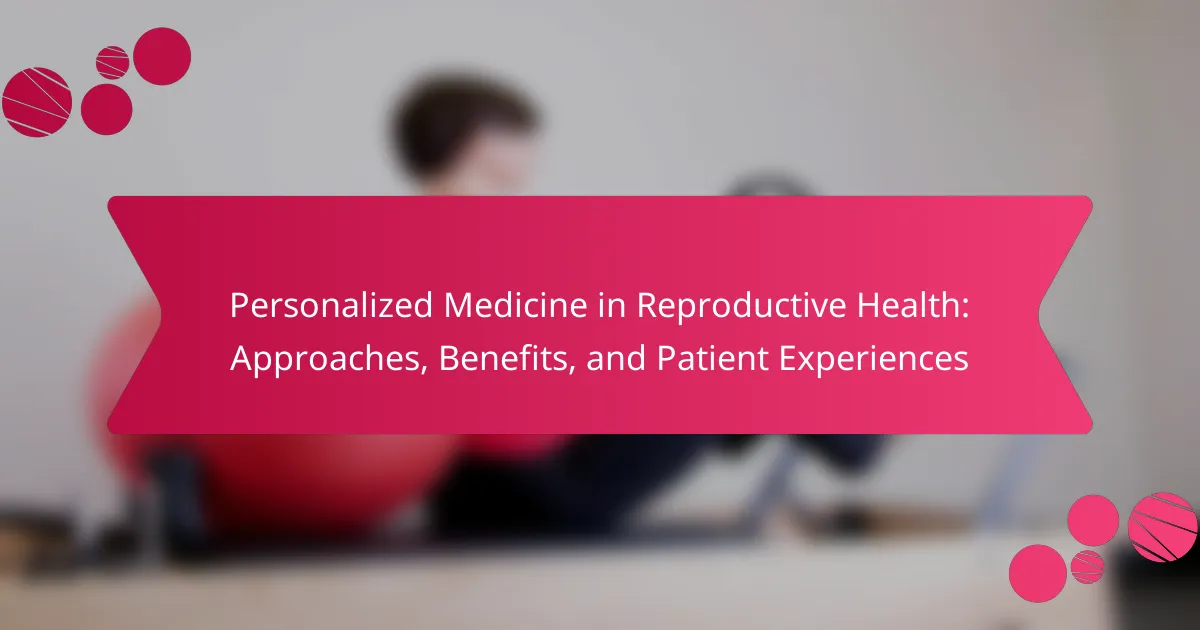Personalized medicine in reproductive health enhances treatment effectiveness by tailoring approaches to individual genetic, environmental, and lifestyle factors. This article explores key principles such as genetic profiling and patient-centered care, highlights the benefits including increased success rates in fertility treatments, and examines patient experiences influenced by demographics and access challenges. By integrating advanced technologies, personalized medicine aims to improve patient engagement and overall health outcomes.
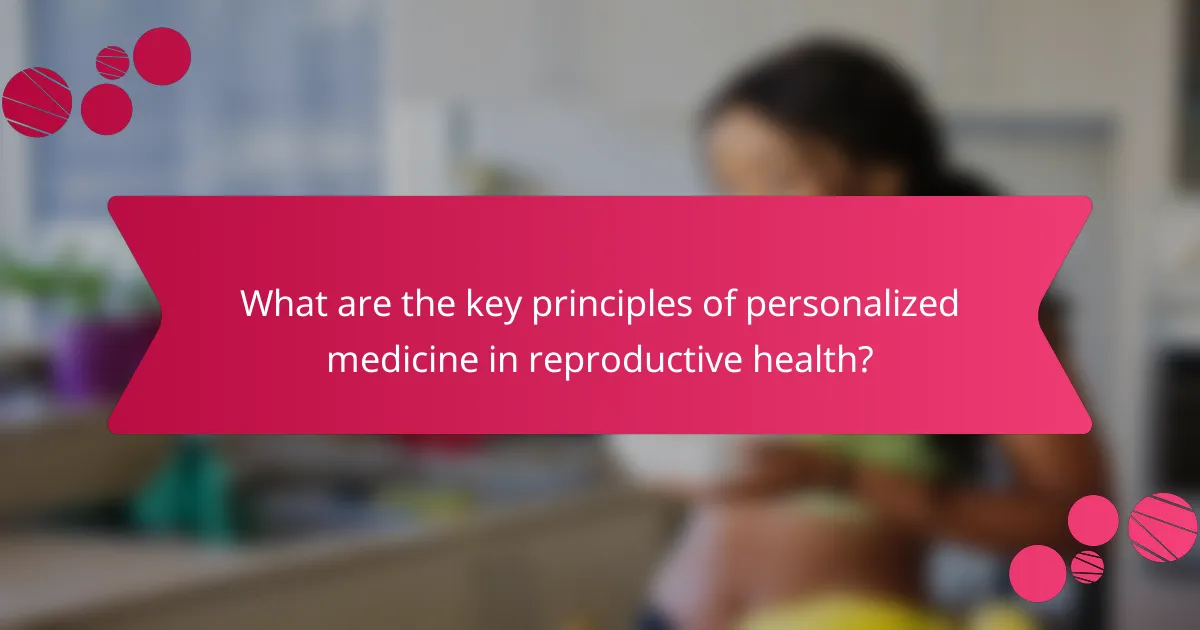
What are the key principles of personalized medicine in reproductive health?
Personalized medicine in reproductive health focuses on tailoring treatments to individual patient characteristics. Key principles include genetic profiling, which helps identify specific risks and treatment responses, and patient-centered care that emphasizes shared decision-making. Another principle is the integration of advanced technologies, such as artificial intelligence, to analyze data effectively. These approaches enhance treatment efficacy and improve patient experiences by aligning interventions with unique health profiles.
How does genetic profiling influence reproductive health decisions?
Genetic profiling significantly influences reproductive health decisions by providing personalized insights into genetic risks. This information allows individuals and couples to make informed choices about family planning, prenatal screening, and potential interventions. For instance, identifying genetic predispositions can help assess risks for inherited conditions, guiding decisions on assisted reproductive technologies. As a result, patients experience tailored care that aligns with their unique genetic makeup, improving outcomes and satisfaction.
What role does patient history play in personalized reproductive health care?
Patient history is crucial in personalized reproductive health care as it informs tailored treatment plans. A comprehensive understanding of a patient’s medical background, family history, and lifestyle factors enhances the effectiveness of interventions. This personalized approach can lead to improved outcomes, such as higher success rates in fertility treatments. Additionally, analyzing patient history allows healthcare providers to identify unique attributes, such as genetic predispositions, which can influence reproductive health strategies. By focusing on individual needs, reproductive health care becomes more precise and effective.

What are the benefits of personalized medicine in reproductive health?
Personalized medicine in reproductive health offers tailored treatment plans based on individual genetic, environmental, and lifestyle factors. This approach enhances the effectiveness of interventions and minimizes adverse effects.
Benefits include increased success rates in fertility treatments, improved management of reproductive disorders, and personalized risk assessments for genetic conditions. For example, women with specific genetic markers may receive targeted therapies that optimize their chances of conception.
Additionally, personalized medicine fosters better patient engagement and satisfaction by involving individuals in their treatment decisions. This collaborative approach can lead to more informed choices about reproductive options and health management.
Overall, personalized medicine transforms reproductive health by focusing on the unique needs of each patient, resulting in improved outcomes and experiences.
How does personalized medicine improve fertility treatment outcomes?
Personalized medicine enhances fertility treatment outcomes by tailoring interventions to individual patient profiles. This approach considers genetic, environmental, and lifestyle factors, leading to more effective treatment plans. For instance, personalized protocols can optimize medication dosages and timing, improving success rates. Studies indicate that personalized strategies can increase live birth rates by up to 30%. By focusing on the unique attributes of each patient, personalized medicine addresses specific reproductive challenges, ultimately fostering better health outcomes in reproductive health.
What psychological benefits do patients experience with personalized approaches?
Patients experience significant psychological benefits with personalized approaches, including reduced anxiety and increased satisfaction. Tailored treatments enhance patients’ sense of control over their health, fostering positive emotional well-being. Personalized care also strengthens the patient-provider relationship, leading to improved trust and communication. As a result, patients often report greater adherence to treatment plans and overall better health outcomes.

Which approaches are commonly used in personalized reproductive health?
Personalized reproductive health commonly employs genetic testing, hormonal profiling, and lifestyle assessments. These approaches tailor interventions based on individual patient needs and biological responses. Genetic testing identifies predispositions to reproductive conditions, while hormonal profiling optimizes treatment plans. Lifestyle assessments integrate environmental and behavioral factors, enhancing overall health outcomes.
What is the role of pharmacogenomics in reproductive medicine?
Pharmacogenomics plays a crucial role in reproductive medicine by tailoring treatments based on individual genetic profiles. This personalization enhances the effectiveness of medications used in fertility treatments and reduces adverse reactions. For instance, specific genetic markers can predict how patients metabolize hormonal therapies, leading to optimized dosing strategies. As a result, pharmacogenomics improves patient outcomes and experiences in reproductive health.
How do lifestyle modifications enhance personalized reproductive care?
Lifestyle modifications significantly enhance personalized reproductive care by tailoring interventions to individual needs. These adjustments can improve hormonal balance, optimize body weight, and enhance overall reproductive health. Integrating lifestyle changes, such as diet and exercise, leads to better patient outcomes. For example, women with polycystic ovary syndrome (PCOS) often experience improved menstrual regularity through weight management and dietary adjustments. Personalization of care based on unique patient attributes, like genetic factors and lifestyle habits, maximizes the effectiveness of reproductive treatments.
What technological advancements support personalized medicine in this field?
Technological advancements supporting personalized medicine in reproductive health include genomic sequencing, data analytics, and artificial intelligence. Genomic sequencing enables tailored treatments based on individual genetic profiles. Data analytics helps in understanding patient-specific responses to treatments. Artificial intelligence enhances decision-making by predicting outcomes and personalizing care plans. These innovations improve patient experiences and outcomes significantly.
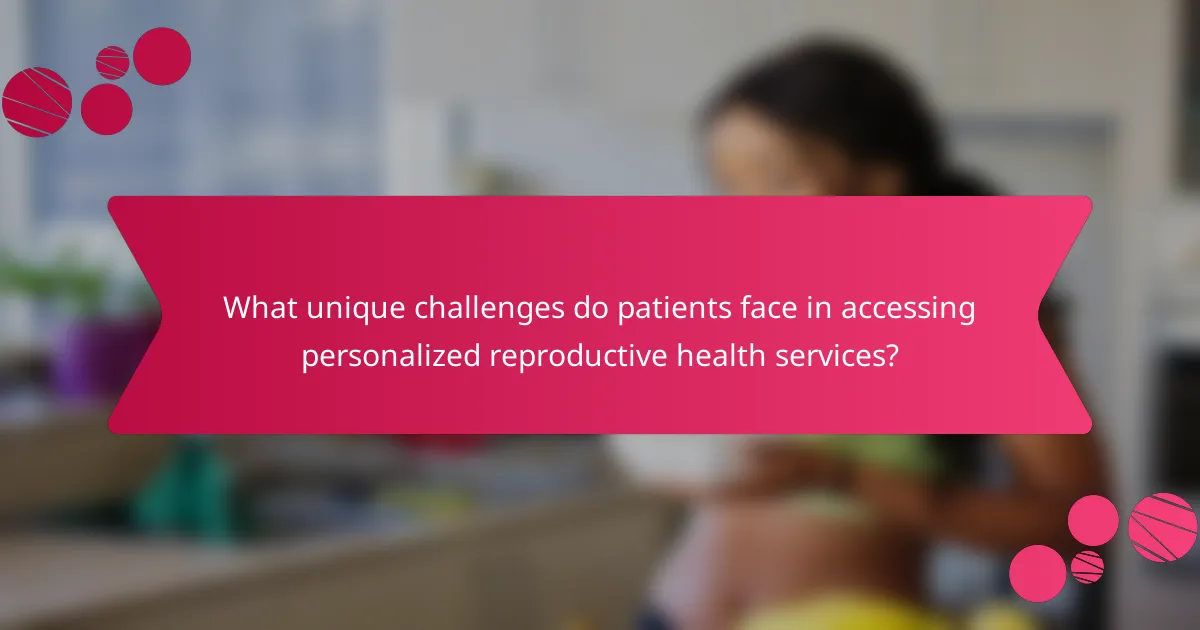
What unique challenges do patients face in accessing personalized reproductive health services?
Patients face unique challenges in accessing personalized reproductive health services, including high costs, limited availability, and a lack of awareness. Financial constraints often restrict access to advanced treatments. Geographic disparities can hinder availability, particularly in rural areas. Patients may also struggle with navigating complex healthcare systems and understanding their options. Moreover, cultural stigmas surrounding reproductive health can lead to reluctance in seeking personalized care. These challenges collectively impact the overall patient experience and outcomes in reproductive health.
How do healthcare disparities affect access to personalized reproductive health?
Healthcare disparities significantly hinder access to personalized reproductive health. Factors such as socioeconomic status, race, and geographic location create barriers to individualized care. These disparities often lead to unequal treatment options, reduced access to advanced reproductive technologies, and varied patient experiences. For instance, marginalized communities may lack access to genetic testing, which is crucial for personalized medicine. Addressing these disparities is essential for improving reproductive health outcomes and ensuring equitable healthcare for all individuals.
What are the regulatory challenges in implementing personalized medicine?
Regulatory challenges in implementing personalized medicine include data privacy concerns, inconsistent guidelines, and the need for robust clinical evidence. These factors complicate the integration of genetic testing and tailored treatments in reproductive health. Variability in regulations across regions creates uncertainty for healthcare providers and patients. Additionally, reimbursement policies often lag behind advancements in personalized medicine, limiting access and affordability for patients.
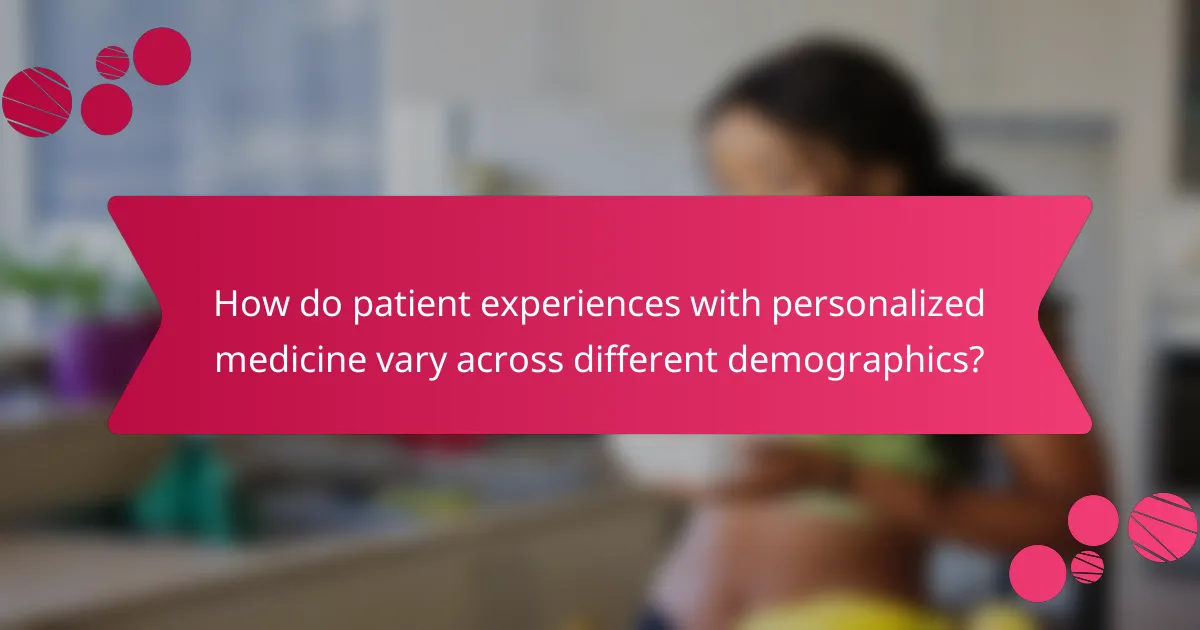
How do patient experiences with personalized medicine vary across different demographics?
Patient experiences with personalized medicine vary significantly across demographics due to factors like age, ethnicity, and socioeconomic status. Younger patients often embrace technological advancements in personalized medicine, while older patients may prefer traditional approaches. Ethnic diversity influences access to personalized treatments, impacting patient satisfaction and outcomes. Socioeconomic status can limit access to resources, affecting overall experiences. Understanding these variations helps tailor personalized medicine strategies to improve patient care across different groups.
What insights do women from diverse backgrounds share about personalized reproductive health?
Women from diverse backgrounds share valuable insights on personalized reproductive health, emphasizing its importance for tailored care. They highlight the need for culturally sensitive approaches and individualized treatment plans that consider unique medical histories and lifestyle factors. Many express that personalized medicine enhances their understanding of reproductive health, leading to better outcomes and increased satisfaction with care. Additionally, they advocate for more inclusive research that reflects varied experiences, ensuring all women’s voices contribute to advancements in reproductive health.
How do cultural beliefs impact the acceptance of personalized medicine?
Cultural beliefs significantly influence the acceptance of personalized medicine in reproductive health. These beliefs shape patient perceptions, trust in medical practices, and willingness to engage with tailored treatments.
For instance, cultures that prioritize traditional medicine may view personalized approaches with skepticism, preferring established methods. In contrast, cultures that embrace innovation may readily accept these advancements, recognizing their potential benefits.
Furthermore, factors such as religious beliefs, societal norms, and family dynamics can affect patients’ openness to personalized treatment plans. Understanding these cultural dimensions is essential for healthcare providers to foster acceptance and improve patient experiences in reproductive health.

What are some rare but noteworthy cases of successful personalized reproductive health interventions?
Successful personalized reproductive health interventions include cases where tailored treatments significantly improved patient outcomes. One noteworthy instance involved a couple with recurrent miscarriages who benefited from a personalized immunotherapy approach, leading to a successful pregnancy. Another example is a woman with polycystic ovary syndrome (PCOS) who achieved successful ovulation through a customized lifestyle and medication plan, resulting in conception. Additionally, genetic screening in a couple with a history of hereditary conditions allowed for informed decisions, ultimately leading to healthy offspring. These rare cases highlight the effectiveness of personalized medicine in addressing unique reproductive health challenges.
Which patients have reported exceptional outcomes from personalized medicine?
Patients with genetic disorders and those experiencing infertility have reported exceptional outcomes from personalized medicine. Tailored treatments have led to improved success rates in assisted reproductive technologies. For instance, patients with specific genetic markers benefit from customized drug protocols, enhancing their chances of conception. Additionally, women with polycystic ovary syndrome have experienced positive results through personalized hormonal therapies, demonstrating the unique effectiveness of individualized approaches in reproductive health.
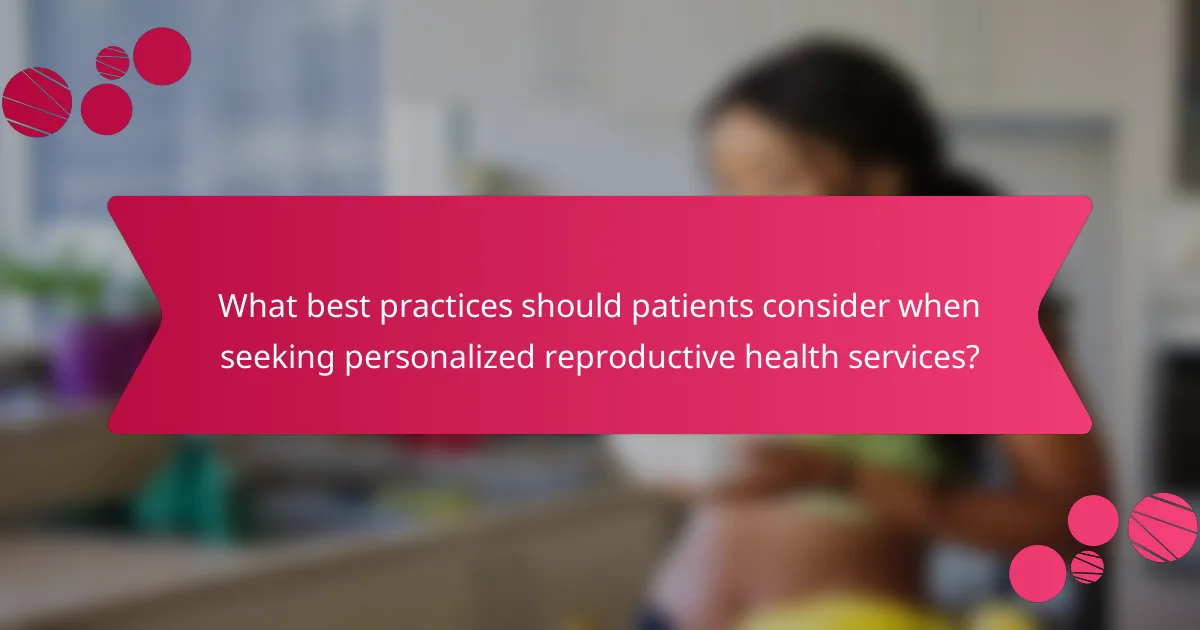
What best practices should patients consider when seeking personalized reproductive health services?
Patients seeking personalized reproductive health services should prioritize finding qualified specialists, understanding treatment options, and considering their unique health needs. Research providers’ credentials and experience in personalized medicine. Engage in open discussions about specific goals and concerns. Evaluate the integration of genetic testing and lifestyle factors into treatment plans. Seek support networks for shared experiences and insights.
How can patients effectively communicate their needs to healthcare providers?
Patients can effectively communicate their needs to healthcare providers by being clear, concise, and prepared. They should articulate specific concerns, symptoms, and treatment preferences.
1. Prepare questions in advance to ensure all concerns are addressed.
2. Use clear language to describe symptoms and their impact on daily life.
3. Share personal health history and any relevant family medical background.
4. Be open about medication usage and any alternative treatments.
5. Actively listen to the provider’s responses and ask for clarification if needed.
6. Follow up after appointments to reinforce communication and ensure understanding.
This approach fosters a collaborative relationship, enhancing personalized medicine in reproductive health.
What common mistakes should patients avoid in personalized reproductive health journeys?
Patients should avoid common mistakes in personalized reproductive health journeys to enhance outcomes. Key mistakes include neglecting to communicate openly with healthcare providers, failing to understand treatment options, and not considering emotional support.
Patients often overlook the importance of personalized approaches, such as genetic testing and tailored therapies, which can significantly improve success rates. Additionally, ignoring lifestyle factors, such as diet and stress management, can hinder progress.
A lack of follow-up on treatment plans is another critical mistake, as regular monitoring is essential for effective adjustments. Lastly, patients should avoid relying solely on online information, as it may not apply to their unique situations.
